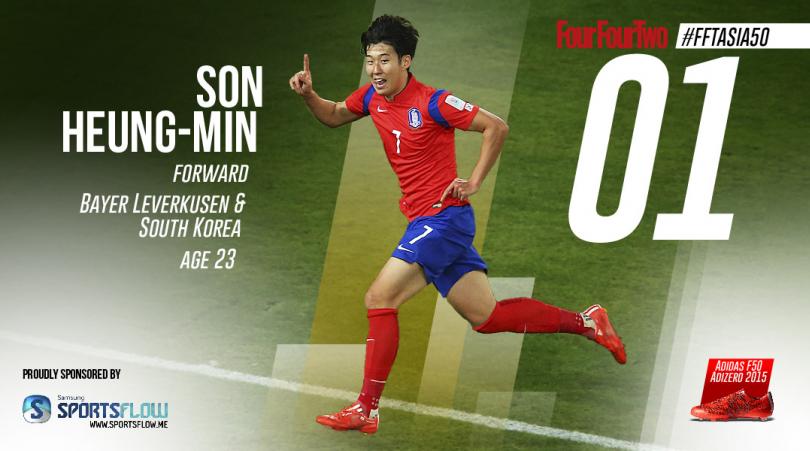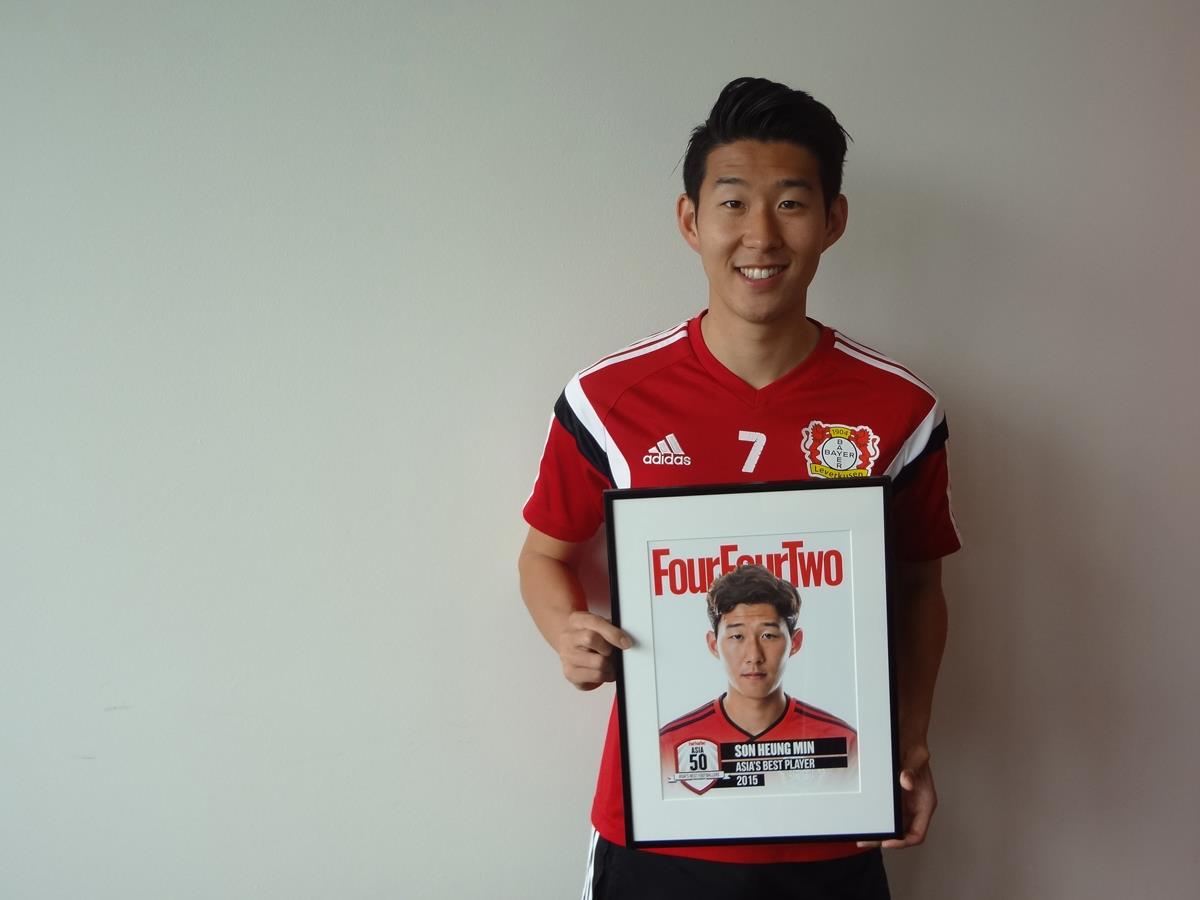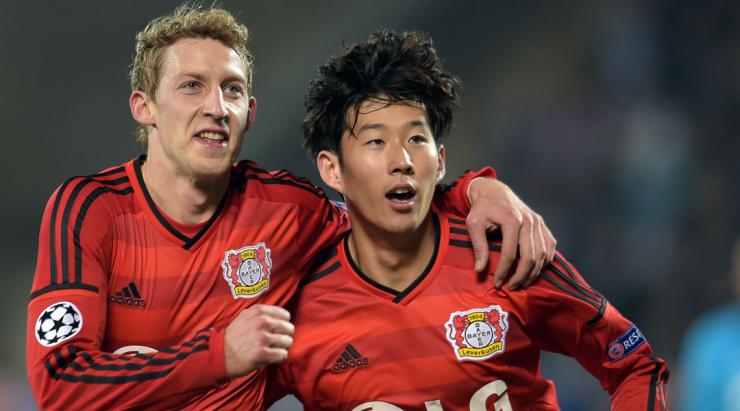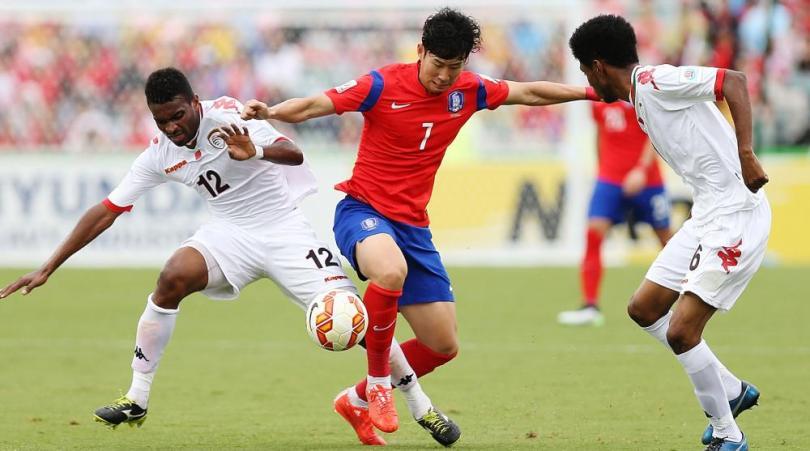Son Heung-min: Before I left Korea for Germany, I was told to first learn the swear words
South Korea’s Son Heung-min has spent a third of his life in Germany. The Bayer Leverkusen star chats with Uli Hesse about feeling like a local, learning German swear words and why the Bundesliga is better than the Premier League.

Apart from making FourFourTwo's Top 50 players in Asia, you have also been named Footballer of the Year by the Korea FA. How important are such individual honours for someone who plays a team sport like football?
It's something very special, because normally it doesn't happen very often in a player's career. I was very happy to learn that I had won this particular vote, because there are so many great Asian players. Of course winning a trophy with your team is what we all try to do, but every player is happy about awards like this one.
It was only a couple of months ago that you narrowly missed out on winning such a trophy with the national team. Where do you see South Korea internationally?
That's difficult to say. The World Cup last year was very disappointing. As a player, you live for such big tournaments and of course it was a great experience for us all. But finishing last in the group was not what we had hoped to do. These things happen, it's human. I still think we have a good future ahead of us, with many young players coming up and a new coach since last September, the German Uli Stielike. We're learning a lot from him. We just have to wait and see if we can take this to the next level.
Europe is where you want to go to play against the best players and the best teams"
Was it another big disappointment to lose the Asian Cup final or were you happy that the team could redeem itself for the poor World Cup?
A bit of both, really. We were all fired up for the Asian Cup because of the World Cup and we desperately wanted to win this title, because that's always your aim as an athlete. If you don't want to finish first, why take part in the first place? So in the build-up to the tournament, I hoped we could win it. But I didn't think we were the favourites to do so. We had some problems in the first two games, but then we did really well.
You came to Europe when you were only 16 and of course it's turned out to be a very good career move. But when you meet up with the national team these days, do you sometimes think you've missed out on something? Such as growing up at home and having friends outside of football?
It's true that I was very young, but I wanted to make my dream come true. Yes, I could have played at home and the K League is a good league. But for a footballer, Europe is where you want to go to play against the best players and the best teams. There was never a moment when I doubted or regretted my decision. Also, I don't think I would have had friends outside of football if I had stayed in Korea. At home, I never had the time to meet someone outside of football, because I was training all the time. And this didn't change here, in Germany. When I was in Hamburg's youth set-up, I hung out with my team-mates and it's been the same ever since. You could say the only people I know are footballers or people who work in football. But I don't mind that. There are many interesting people in football.

You went to Hamburg together with two other Korean teenagers, who didn't really come through. Do you know where they are these days?
They are playing in Japan. One in the first division, the other in the second. I don't really know why I made it here and they didn't. I guess I just wanted it so much that it eventually worked out. To be honest, I don't really know how I managed to adapt to Germany at only 16 years of age. Of course I was a bit scared.
Your German is very good. When you were in Hamburg, did the club organise language lessons for you and the two other players?
Yes, they had a teacher for us and I was very diligent during the first year. It was difficult, because German is totally different from Korean. I guess today I wouldn't have the patience and the determination to study so intensely, but at 16 I did. And I learned very fast. I don't know why, it just came easy to me.
When I'm not training or playing, you can find me at home, watching Korean films"
What was the first German word you learned?
It must have been a swear word. Before I left Korea, I was told that players who move abroad must first learn the swear words. The reason is that you can't have people calling you names while you just look at them, smiling politely, because you just don't know what it is they are saying. It turned out to be a very useful piece of advice.
Get FourFourTwo Newsletter
The best features, fun and footballing quizzes, straight to your inbox every week.
You've been in Germany for seven years now, almost a third of your life. Do you feel half-German, half-Korean?
Oh no, no! I speak German reasonably well and I have come to like German food. It's a great country and a good place to live, but I'm Korean through and through. When I'm not training or playing, you can find me at home, watching Korean films.

Is that what you do in your free time – watching films?
Yes. I don't really have a hobby.
What about golf?
Everybody tells me how great golf is and that I must learn it, but I think it's not the game for me. It would drive me nuts. Most of the time you're standing around, doing nothing. I'm interested in golf because it's big in Korea and sometimes I watch it on television. But playing? You hit the ball as far as you can and then you search for it. That's boring. I'd rather stay at home, relax and listen to music. That's also why I can't tell you much about the city, Leverkusen. I only drive from my home to the training ground and back.
Why did you leave Hamburg for Leverkusen?
The reason was that I wanted to play in Europe. At Hamburg, we failed to qualify for the Europa League, let alone the Champions League. But Bayer have the quality to achieve this. And as you can see, I made the right decision. The club have reached the Champions League two seasons in a row and I feel very much at home here.
You can't become a good player without practising the little things, the essential basics, over and over again"
Do people at home, in Korea, have the slightest idea where Leverkusen is?
Oh, yes. Cha Bum-kun played here, so people in Korea are familiar with the club. And I think they know where the city is. Right next to Cologne and near Düsseldorf (laughs).
How important was your father, the former international Son Woong-jun, for your career?
Without him, I wouldn't be sitting here right now, receiving an award and talking to you. He was the one who drove me on and who kept telling me what I needed to do to improve, even during my first years as a professional. When I was a kid, he trained with me, every single day. Two sessions per day. Normally we'd be working on my technique, keeping the ball up with both feet and so on. It wasn't always easy for me, because he never allowed me to miss one of those sessions. But he knew a lot about football, so the training was good. And looking back now I have to say that I owe it all to him. You can't become a good player without practising the little things, the essential basics, over and over again.

There was a moment when your career hung in the balance, right? After the first year at the Under-17 level, Hamburg didn't offer you a contract extension. What was that all about?
To be honest, I don't know. My contract was for one year with the Under-17 team, the "B Youth", as it's called in Germany. At the end of the season, I wasn't offered a new contract. I desperately wanted to stay in Europe, because I thought that if I went back home, I would never get a second chance. So I went to a few trials. I had one with the German club Bochum, who were then in the Bundesliga. I also went to England and had trials at Blackburn Rovers and Portsmouth. Then I played the Under-17 World Cup and did quite well. Suddenly Hamburg offered me a new contract after all. I could have gone to England at that point, but I didn't want to. I didn't speak English — still don't, actually — and I was a bit anxious to start all over again. So I went back to Hamburg.
Is England an option for the future? Many Asian players are looking for a move to the Premier League, because it's so big and popular in Asia.
That's true, yes. The Premier League is massive and most Koreans support an English team. But I think the Bundesliga is the best league in the world at the moment. People say that the Premier League is very competitive and that every team can beat every other team. But when you look at the standings, it's always the same four or five teams at the top. Now look at a club like Borussia Dortmund here in Germany. They were in the Champions League final in 2013. Then they finished second behind Bayern in 2014. But back in February they were suddenly in last place in the Bundesliga! For me, the Bundesliga is the most attractive league and more and more people in Asia are becoming interested in it, because we now have a lot of Asian players in the league.
Who, in your opinion, was the best-ever Asian player?
I'm Korean, so let me talk about Koreans only. It was a long time ago that he played, so maybe there are some people reading this who don't remember him, but Cha Bum-kun is a legend and an idol. He's very famous in Korea but also here, in Germany, because he played for Leverkusen and Frankfurt. For my generation, Park Ji-sung is another hero, an inspiration.
You're well on your way to becoming a legend, too.
I don't know, let's see. I'm young. I still have time to achieve something.
Debate the #FFTASIA50
The FourFourTwo Asia50 is in association with Samsung SportsFlow – bringing you the most comprehensive sports coverage in one place via a single app. Find out more and download at www.sportsflow.me
